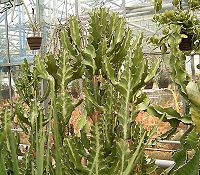| Euphorbia lactea | ||||||||||||||||||||||
|---|---|---|---|---|---|---|---|---|---|---|---|---|---|---|---|---|---|---|---|---|---|---|
 | ||||||||||||||||||||||
| Plant Info | ||||||||||||||||||||||
|
| ||||||||||||||||||||||
| Scientific classification | ||||||||||||||||||||||
| ||||||||||||||||||||||
| Binomial name | ||||||||||||||||||||||
| Euphorbia lactea Haw. | ||||||||||||||||||||||
Euphorbia lactea (Mottled Spurge, Frilled Fan or Elkhorn) is a species of spurge native to tropical Asia, mainly in India.[1][2]
It is an erect shrub growing up to 5 m tall, with succulent branches 3-5 cm diameter, ridged, with a triangular or rhombic cross-section; the ridges are spiny, with short spines up to 5 mm long. The leaves are minute, and soon deciduous.[2] All parts of the plant contain a poisonous milky latex.[3]
It is used medicinally in India.[4] It is widely grown as an ornamental plant, both in the tropics, and as a houseplant in temperate regions; a number of cultivars have been selected for ornamental use, notably 'Cristata' with frilled branching.[2][5] Other colloquial names include Candelabra spurge, Candelabrum tree, Candelabra cactus, Candelabra plant, Dragon bones, False cactus, Hatrack cactus, Milkstripe euphorbia, Mottled candlestick.
References
- ↑ Germplasm Resources Information Network: Euphorbia lactea
- ↑ 2.0 2.1 2.2 Huxley, A, ed. (1992). New RHS Dictionary of Gardening. ISBN 0-333-47494-5
- ↑ Poisonous plants: Euphorbia lactea
- ↑ Plant of the Week.org Euphorbia lactea
- ↑ Pacific Island Ecosystems at Risk: Euphorbia lactea
